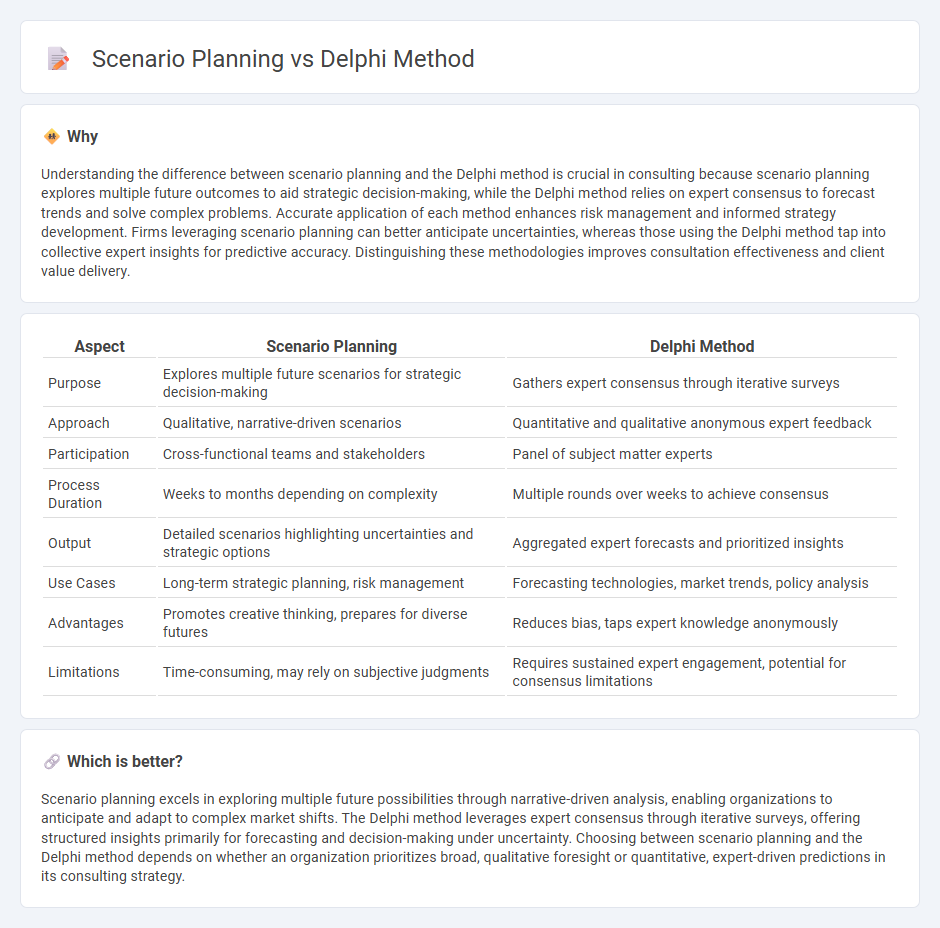
Scenario planning explores multiple future possibilities by constructing detailed narratives based on driving forces, uncertainties, and trends, enabling organizations to anticipate and prepare for diverse outcomes. The Delphi method gathers expert opinions through iterative surveys to achieve consensus on complex issues, refining forecasts and reducing uncertainty. Discover how integrating scenario planning and the Delphi method can enhance strategic decision-making in your consulting projects.
Why it is important
Understanding the difference between scenario planning and the Delphi method is crucial in consulting because scenario planning explores multiple future outcomes to aid strategic decision-making, while the Delphi method relies on expert consensus to forecast trends and solve complex problems. Accurate application of each method enhances risk management and informed strategy development. Firms leveraging scenario planning can better anticipate uncertainties, whereas those using the Delphi method tap into collective expert insights for predictive accuracy. Distinguishing these methodologies improves consultation effectiveness and client value delivery.
Comparison Table
| Aspect | Scenario Planning | Delphi Method |
|---|---|---|
| Purpose | Explores multiple future scenarios for strategic decision-making | Gathers expert consensus through iterative surveys |
| Approach | Qualitative, narrative-driven scenarios | Quantitative and qualitative anonymous expert feedback |
| Participation | Cross-functional teams and stakeholders | Panel of subject matter experts |
| Process Duration | Weeks to months depending on complexity | Multiple rounds over weeks to achieve consensus |
| Output | Detailed scenarios highlighting uncertainties and strategic options | Aggregated expert forecasts and prioritized insights |
| Use Cases | Long-term strategic planning, risk management | Forecasting technologies, market trends, policy analysis |
| Advantages | Promotes creative thinking, prepares for diverse futures | Reduces bias, taps expert knowledge anonymously |
| Limitations | Time-consuming, may rely on subjective judgments | Requires sustained expert engagement, potential for consensus limitations |
Which is better?
Scenario planning excels in exploring multiple future possibilities through narrative-driven analysis, enabling organizations to anticipate and adapt to complex market shifts. The Delphi method leverages expert consensus through iterative surveys, offering structured insights primarily for forecasting and decision-making under uncertainty. Choosing between scenario planning and the Delphi method depends on whether an organization prioritizes broad, qualitative foresight or quantitative, expert-driven predictions in its consulting strategy.
Connection
Scenario planning and the Delphi method are interconnected as they both facilitate strategic decision-making by harnessing expert insights and forecasting future uncertainties. The Delphi method gathers structured expert opinions through iterative rounds to achieve consensus, which feeds into developing multiple plausible scenarios in scenario planning. This integration enhances the robustness and reliability of foresight in consulting projects, enabling organizations to better anticipate risks and opportunities.
Key Terms
Expert Consensus (Delphi Method)
The Delphi Method emphasizes expert consensus through iterative rounds of surveys, allowing anonymous feedback to refine predictions and reduce bias. This structured communication technique gathers diverse expert opinions to achieve a reliable forecast on complex issues. Explore how the Delphi Method enhances decision-making in uncertain environments.
Alternative Futures (Scenario Planning)
Scenario planning emphasizes creating diverse, plausible alternative futures to help organizations anticipate uncertainties and strategic challenges, unlike the Delphi method, which concentrates on expert consensus forecasting. By exploring multiple potential scenarios, scenario planning enhances decision-making flexibility and resilience in dynamic environments. Explore detailed insights on how scenario planning shapes strategic foresight and prepares organizations for varied future possibilities.
Iterative Feedback (Delphi Method)
The Delphi method emphasizes iterative feedback by collecting expert opinions through multiple rounds of surveys to achieve consensus on complex issues. Scenario planning focuses on developing diverse future scenarios to prepare strategic responses without necessarily seeking consensus. Explore how iterative feedback shapes decision-making in both approaches to enhance forecasting accuracy.
Source and External Links
What is the Delphi Method - Pros, Cons, and Examples [2025] - The Delphi method is a group decision-making and iterative forecasting technique involving a panel of experts who answer questionnaires in rounds, with summary feedback enabling convergence toward consensus, illustrated by practical real-life applications.
Generating Evidence Using the Delphi Method - RAND Corporation - The Delphi method is characterized by anonymity, iterative data collection, participant feedback, and statistical group response analysis to elicit expert consensus on complex topics when empirical data is lacking.
Delphi method - Wikipedia - Developed originally for systematic forecasting, the Delphi method uses structured rounds of expert questionnaires with anonymized feedback to achieve a consensus or stable group judgment, widely used in health, research, and policy development.
 dowidth.com
dowidth.com